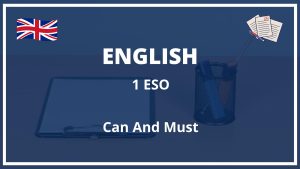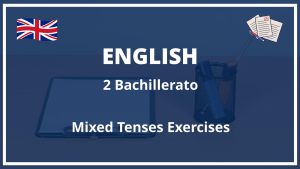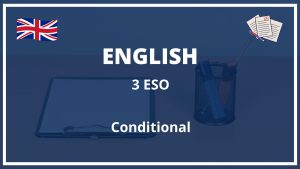
Abrir Ejercicios Modal Verbs 4 ESO | Exercices
The Modal Verbs in English are a small group of verbs which are very important because they express ability, doubt, certainty, obligation and advice.
The main modal verbs are: can, could, may, might, must, shall, should, will, would.
Modal verbs are always followed by the infinitive of another verb (without ‘to’).
For example:
I can speak English.
They could speak English when they were children.
We may go out tonight.
You might see him at the party.
You must be here at 9 o’clock.
They shall arrive tomorrow.
You should study more.
We will help you.
I would like a coffee, please.
The main differences between the modal verbs are in the degree of ability, doubt, certainty, obligation or advice which they express.
For example:
Can and Could
Can and could are used to express ability or possibility.
Can is used to express ability or possibility now or in the future:
I can speak English.
Could is used to express ability or possibility in the past:
Could you speak English when you were a child?
May and Might
May and might are used to express possibility.
May is used to express possibility now or in the future:
We may go out tonight.
Might is used to express possibility in the past:
You might see him at the party.
Must
Must is used to express obligation or certainty.
Must is used to express obligation now or in the future:
You must be here at 9 o’clock.
Must is also used to express certainty:
This must be the right place.
Shall
Shall is used to express obligation or certainty.
Shall is used to express obligation now or in the future:
They shall arrive tomorrow.
Shall is also used to express certainty:
Who shall I say is calling, please?
Should
Should is used to give advice or to express opinion.
Should is used to give advice:
You should study more.
Should is also used to express opinion:
I think you should study more.
Will and Would
Will and would are used to express intention or desire.
Will is used to express intention now or in the future:
We will help you.
Would is used to express intention in the past:
I would like a coffee, please.
Ejercicios Resueltos Modal Verbs Ingles 4 Eso
Los verbos modales son un tipo de verbo que se utiliza para expresar un juicio de modo, de cantidad, de posibilidad o de obligación. Se colocan delante del verbo principal y no requieren de un auxiliar para formar la negación o la interrogación. En inglés, los verbos modales más comunes son can, could, may, might, shall, should, will, would, must y ought to. A continuación vamos a ver una serie de ejercicios resueltos de verbos modales.
Ejercicio 1: Completa las siguientes oraciones usando el verbo modal adecuado. Ten en cuenta que algunas de las oraciones requieren el uso de un auxiliar para formar la negación o la interrogación.
1. I ______ go out tonight. (can / may / must / ought to)
2. You ______ come with us if you want. (can / may / must / ought to)
3. She ______ be at home now. It’s only 6 o’clock. (can’t / may / must / ought to)
4. We ______ have a party next weekend. (can / may / must / ought to)
5. You ______ be more careful! You ______ break that glass! (can / may / must / ought to)
6. I ______ see him tomorrow. He’s coming to visit me. (can / may / must / ought to)
7. They ______ be at the cinema now. I hope they’re having a good time. (can’t / may / must / ought to)
8. I ______ go now. I have to catch my train. (can / may / must / ought to)
9. You ______ turn off the light when you leave the room. (can / may / must / ought to)
10. We ______ be more careful! We ______ make so much noise! (can / may / must / ought to)
Ejercicio 2: Completa las siguientes oraciones usando el verbo modal adecuado. Ten en cuenta que algunas de las oraciones requieren el uso de un auxiliar para formar la negación o la interrogación.
1. I ______ go out tonight. (can / may / must / ought to)
2. You ______ come with us if you want. (can / may / must / ought to)
3. She ______ be at home now. It’s only 6 o’clock. (can’t / may / must / ought to)
4. We ______ have a party next weekend. (can / may / must / ought to)
5. You ______ be more careful! You ______ break that glass! (can / may / must / ought to)
6. I ______ see him tomorrow. He’s coming to visit me. (can / may / must / ought to)
7. They ______ be at the cinema now. I hope they’re having a good time. (can’t / may / must / ought to)
8. I ______ go now. I have to catch my train. (can / may / must / ought to)
9. You ______ turn off the light when you leave the room. (can / may / must / ought to)
10. We ______ be more careful! We ______ make so much noise! (can / may / must / ought to)
Ejercicio 3: Completa las siguientes oraciones con el verbo modal adecuado. Ten en cuenta que algunas de las oraciones requieren el uso de un auxiliar para formar la negación o la interrogación.
1. I ______ speak French fluently, but I ______ speak Spanish very well. (can / may / must / ought to)
2. They ______ be at home now. It’s only 7 o’clock. (can’t / may / must / ought to)
3. We ______ have a party tomorrow night. (can / may / must / ought to)
4. You ______ turn off the light when you leave the room. (can / may / must / ought to)
5. She ______ be at the office now. She ______ work late today. (can’t / may / must / ought to)
6. I ______ go out tonight. I ______ meet my friends. (can / may / must / ought to)
7. You ______ come with us if you want. (can / may / must / ought to)
8. They ______ be at the cinema now. I hope they’re having a good time. (can’t / may / must / ought to)
9. I ______ go now. I have to catch my train. (can / may / must / ought to)
10. You ______ be more careful! You ______ break that glass! (can / may / must / ought to)








